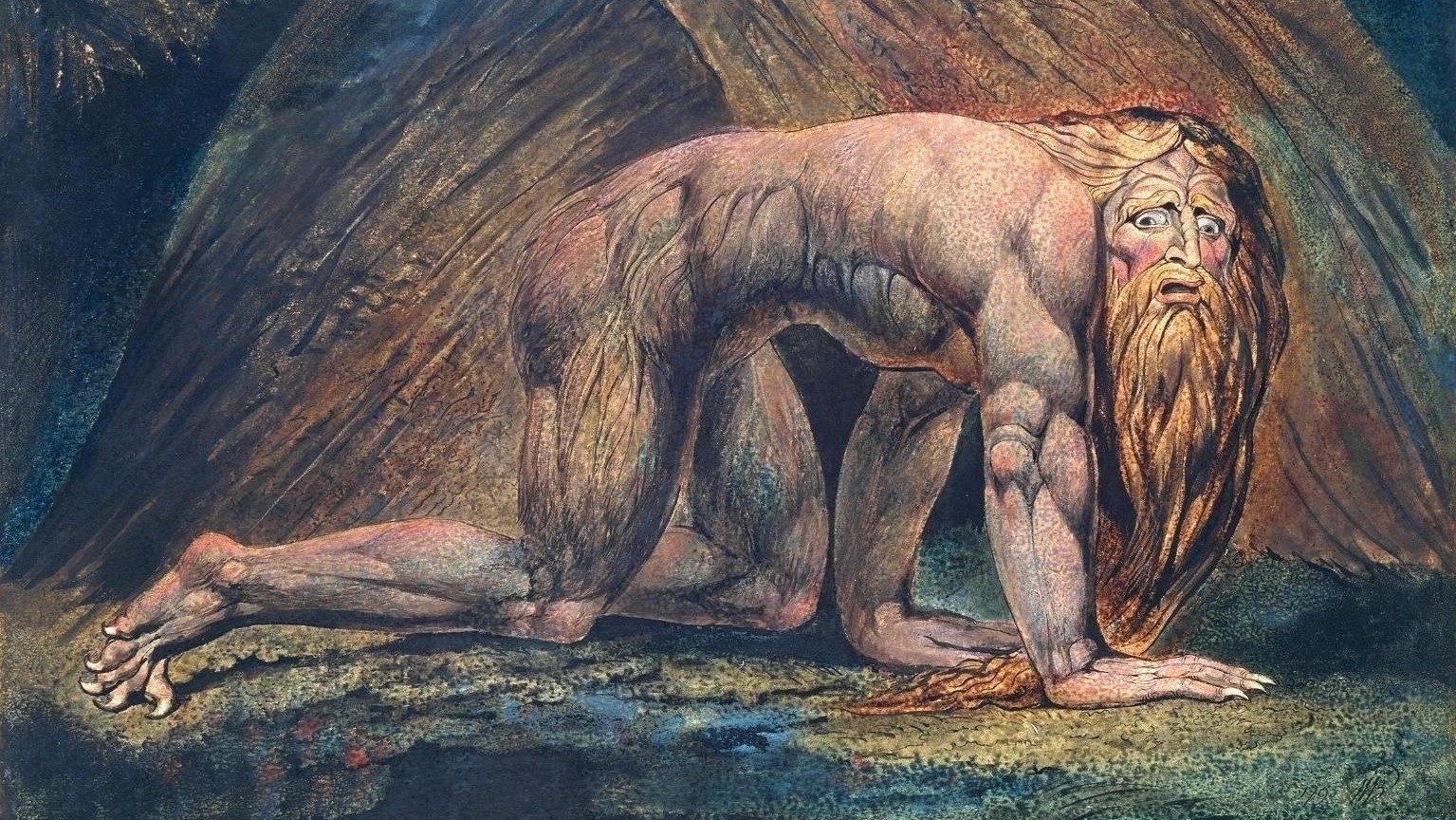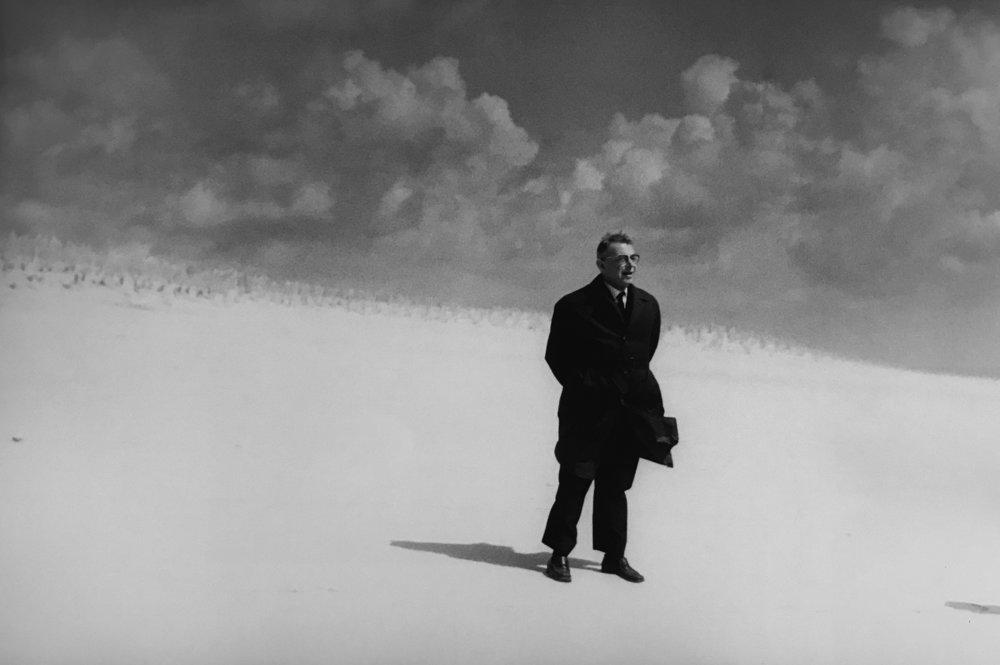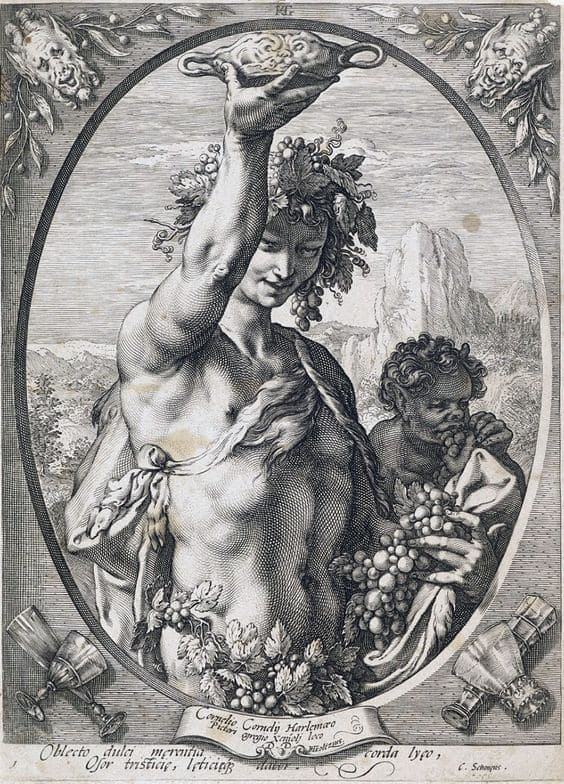Scepticism and Anxiety

Featured image: Nebuchadnezzar (1795–c.1805) by William Blake. The doubts of Xenophanes remain all too pertinent to our ideologies when we assume their validity, their truth and their necessity without due anguish as to their origin: the possibility that even the highest virtues are a dogma of our epoch.
Scepticism has long been a potent tool amongst laymen and philosophers alike in the arduous task of uncovering the origins of our most deeply enshrined beliefs. Doubt of the truth eventually inspires revelation or despair after we have sifted through the vacuous origins of belief.
Amongst the first to express this kind of sceptical genealogical anxiety was the pre-Socratic philosopher Xenophanes of Colophon:
Amidst the archaic fragments of Xenophanes there is a conspicuous sceptical anxiety driving its way through the core of Hellenistic theological values, the creeping suspicion that one’s conception of the world and its truths are dictated not by a concrete reality but rather by one’s particular constitution, place of birth and upbringing. If animals would depict their gods in their image, then one cannot anthropomorphise one’s own gods without the disconcerting doubt that this may well be the result of a prejudice of birth.
A valueless world
Rolling through the ages, similar scepticism can equally be found in the works of Socrates, Augustine, and Michel Foucault. Consistent to such philosophers is a concern for the meanings we craft and the worlds we forge, amidst which secretes an insipid value scepticism.
Perhaps the most influential figure in transporting value scepticism to our own age is Friedrich Nietzsche in On the Genealogy of Morals. I take it that Nietzsche’s overt endeavour in this work is the ruthless exposure of Christian morality as fraudulent and the malignant manifestation of a servile revolt inspired by the ascetic priest, whose baleful ideology carries the weak and enslaves the strong. Like Xenophanes, Nietzsche harries the God(s), and, in doing so, he finds a malign fabrication born of a resentful pity of carnal vitality and an impotent impulse to self-discipline.
Nietzsche drags us from Christianity’s dogmatism and invites us to take charge of our own morals and direct the movements of history towards vitality over and against sado-masochistic despair.

Los is an earthly prophet in William Blake’s The Book of Urizen; Urizen is an abstraction of a human self, the embodiment of reason and law. ‘Los howld in a dismal stupor, Groaning! gnashing! groaning! Till the wrenching apart was healed But the wrenching of Urizen heal'd not’.
While this revolutionary approach to historicity has a distinct allure and secretes individualistic empowerment, I find it conceptually and practically flawed. Having demolished the tyranny of any one system’s claim to truth—by sceptically revealing its genealogical path—the piercing question then becomes: what are one’s convictions to be? Before creating a new world, we must first devise it; before willing a new truth, we are first confronted with ‘the value of this will’, to borrow Nietzsche’s words. Scepticism takes us thus far: to an amorphous will—angst-sodden clay to trembling hands in conviction’s absence.
Aporia and ataraxia
These genealogical issues lurking at the foundations of our beliefs, within the dank cellars of consideration, are of the same breed as those which the Hellenistic sceptic encountered: having undermined one’s beliefs through rigorous sceptical investigation, there is only bafflement and perplexity (aporia), a state in which we lack passage.
The Hellenistic sceptic supposes that this state might be used as a gateway to a greater sense of tranquillity (ataraxia) since all judgment has been suspended. But, as Miles Burnyeat evocatively draws out in Explorations in Ancient and Modern Philosophy, why should bafflement result in ‘tranquillity rather than acute anxiety’? We are sterile before an impasse.

Of course, as any good Sartrean will know, freedom and crushing responsibility go hand in hand. (Source)
Similarly to value scepticism, there’s no immediate sense in which a recognition of the contingency of truth, ideology and ethics should be liberating rather than oppressive upon genealogical scepticism. Genealogical contingency is profoundly functional insofar as it allows one to smell out a potential for revolution in Foucauldian fashion. Yet this serves as no remedy to the incessant anxiety born of Nietzschean freedom. Before one may act, there is the Herculean labour—or perhaps Sisyphean struggle—of justifying one’s beliefs to oneself.
Dionysian vitality
Yet, in Nietzsche’s own philosophy, it is not obviously the case that he is a philosopher of anxiety. Indeed, one might be deceived into thinking Nietzsche an almost entirely-life-affirming philosopher when confronted with the sheer dynamism of his Dionysian revelry and admiration of masterful and strong spirits. This is nowhere more evident than in On the Genealogy of Morals. The suffering Christ is humiliated before the tragic vitality of the Greeks
However, I take Nietzsche to be just as much a philosopher of anxiety as of vitality:
That is, for all the vitriolic charm of Nietzsche’s ‘magnificent, marauding blond beast’ (Zarathustra’s Lion) and of Dionysian ‘intoxication’, he cannot prescribe value unto his readers. I take Nietzsche to be lucidly weaving his works towards ‘seducing’ his readers ‘to a continuation of life’, not imbuing it with value to alleviate their anxiety.
Doubt, dread, fear and angst ooze from each of his books under the pressure of value creation, and where we find the most-lucidly-joyous Bacchanalia festivals, the mortal coil of ‘et in arcadia ego’—the solemn sarcophagus amidst a sublime scape—remains a foreboding presence. It is precisely between vitality and despair that I find Nietzsche lurking amongst the fruit-laden vines, whispering a serpentine ode of seductive doubt and passion in the same way Rudyard Kipling’s devil chants: ‘It’s pretty, but is it art?’

Et in Arcadia ego (1637–1638) by Nicolas Poussin. ‘Even in Arcadia, there am I’: Death roams the natural splendour of Arcadia.
A road to anxiety
Not Dionysian vitality then, but anxiety—though not anxiety for its own sake, the lusty acolyte of suffering, but anxiety induced by the impossible commission to generate, the condition on which ‘existence and the world [might] appear justified’.
Meaning wrestled from the palm of the Almighty through the sublime. The absurd endeavour. Causa sui—a lawgiver. Subject neither to the dictum of God or nature. Could Nietzsche muster such artistic spirit?

Nietzsche found the Dionysian spirit positively intoxicating. The ‘magnificent, marauding blond beast’ forever revels and roves amidst the aphorisms of Nietzsche.
Past the languid Camel. Amongst the rebellious carnage of the Lion. Never quite the innocent spontaneity of the child. Nietzsche falls short of an ultimate remedy.
Faced with the torment of an act of God, the philosopher—relentless youth, insatiable spirit—is ‘too inquisitive to not keep “coming back to itself” again’.
The problem of value scepticism is ignited by this genealogical anxiety: we seek value but know not of its form. It is not merely a problem of overcoming dogma but of creating dogma. This is the absurd indictment of impossible freedom and of sceptical dread to which Nietzsche was incarcerated as a debtor of 2000 years of Christianity. Perhaps his experience of value anxiety, of nihilism, ‘is to serve as an example, not to be imitated, which would be folly, but as something to learn from and from which new life can grow. He is offering himself to us as a sacrifice: a free offering’ (Ansell-Pearson).
Where we stand in relation to servitude and creativity I suspect cannot be made manifest without a significant deal of anxiety. Perhaps the answer lies in a provocative and self-consuming strain of Calvinism: that it would be precisely the habit of those not destined to create value to languish in the despair of continual failure.
And if, indeed, the philosopher cannot help but ‘come back to himself’, then however excruciating it may be, they shall strive regardless.
